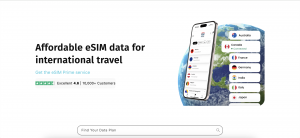As digital transformation reshapes the global travel and communication landscape, North African countries are increasingly embracing eSIM (embedded SIM) technology. This shift is enabling travelers and residents in Morocco, Tunisia, and other parts of the region to stay connected without the limitations of traditional physical SIM cards.
With the growing use of smartphones and increased international mobility, eSIMs have become an ideal solution for African travelers who seek flexible, immediate access to mobile data without visiting local SIM shops or facing high roaming charges.
Morocco and Tunisia Lead North Africa’s eSIM Adoption
In Morocco, tourism is recovering steadily, with millions of international visitors expected in 2025. Moroccan citizens traveling abroad are also seeking more efficient ways to stay connected. The introduction of eSIM options specifically for Morocco allows both locals and tourists to access mobile data quickly and easily.
The Morocco eSIM provides a convenient way for travelers to activate data services remotely, allowing them to stay connected as they travel across cities like Casablanca, Marrakech, and Fes. This growing adoption indicates a wider interest in digital mobility solutions throughout the country.
Tunisia has also experienced a significant rise in eSIM usage, especially among international visitors exploring popular destinations such as Tunis, Sousse, and Djerba. The Tunisia eSIM offers seamless mobile data access without the need for a physical SIM card, ideal for short-term stays or visitors from neighboring countries.
Why eSIMs Are Crucial for African Travelers
eSIM technology is transforming the way people connect to mobile networks across Africa, particularly in North African countries where regional travel is frequent and digital adoption is on the rise. For users in Morocco, Tunisia, Algeria, and Egypt, eSIMs offer enhanced convenience and security when traveling both regionally and internationally.
Unlike traditional SIM cards, eSIMs can be downloaded and activated remotely, allowing users to switch data plans without dealing with physical cards. This is especially beneficial in areas where SIM availability is limited or for travelers frequently crossing borders.
Industry analysts have noted that Africa, with its increasing smartphone penetration and growing demand for cross-border digital services, represents a key region for eSIM growth.
Supporting Africa’s Digital Infrastructure Goals
Governments and telecom providers in North Africa have been focused on modernizing infrastructure and expanding digital access. The integration of eSIM technology aligns with these national strategies, contributing to improved mobile accessibility and reducing reliance on physical distribution networks.
Additionally, eSIM technology supports sustainability efforts by minimizing plastic waste related to traditional SIM cards and packaging.
Looking Ahead: The Future of eSIM in North Africa
The future of mobile connectivity in North Africa is increasingly digital. As more devices become eSIM-compatible and user awareness grows, adoption is expected to increase. For both North African travelers and international visitors, this transition offers easier access to reliable mobile data while eliminating the hassle of traditional SIM card purchases.
Travelers can now explore North Africa—from the medinas of Marrakech to the historic streets of Tunis—staying effortlessly connected thanks to the convenience and flexibility provided by eSIMs.
To learn more about regional eSIM access:
Morocco: eSIM for Morocco
Tunisia: eSIM for Tunisia
About eSIM Prime
eSIM Prime offers digital SIM solutions for travelers in over 150 countries, supporting immediate activation and flexible connectivity. The platform enables users to stay connected without physical SIM cards, contributing to a more accessible and sustainable digital future.

![[PR – MENA] BingX and John Terry Team Up to Share the Playbook for Greatness at TOKEN2049 Singapore](https://meatechwatch.com/wp-content/uploads/2025/10/image_2025-10-10_13045126-150x95.jpeg)













